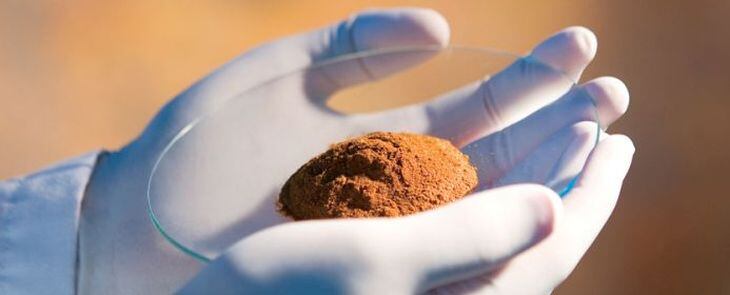A heat-,pH-, and pressure-stable yeast fermentate made with a propietary Non GMO strain of Saccharomyces cerevisiae originally developed for the animal feed market and acquired by Cargill as part of its 2017 acquisition of Diamond V Mills, EpiCor is generally recognized as safe according to a GRAS determination filed by Cargill in February 2020.
Cargill has submitted this to the FDA and hopes to receive a ‘no objections’ letter early next year, Cargill Health Technologies president Chuck Warta told FoodNavigator-USA.
“When we acquired Diamond V, the EpiCor brand had a good reputation in the supplement space; it’s grown at a compound annual growth rate of 67% since we made the acquisition, and we’ve used that success and momentum to take this into functional foods and beverages.
“We’ve developed a range of prototypes from teas and chocolate bars to gummies and yogurts.”
Supplied as a shelf-stable powder that can be listed on the ingredients list as ‘yeast fermentate,’ ‘dried yeast fermentate’ or ‘yeast fermentate made with Saccharomyces cerevisiae,’ EpiCor is highly soluble and dispersible in water (but not 100% soluble) and has a three-year shelf-life when stored as recommended in a dry environment in its original closed container.
According to the GRAS determination, the umami-tasting ingredient can be used in a wide range of foods, including cookies, meal replacement and probiotic beverages, nutritional bars, soy milk, yogurt and yogurt beverages, soy protein bars, fruit beverages, chocolate confections, and soups.
‘Like a multivitamin for your immune system’
The fact that EpiCor’s health benefits are backed by eight peer-reviewed human clinical studies - six of which are double-blinded, placebo-controlled ‘gold standard’ trials – gives it a significant advantage over many other functional ingredients trying to cross over from supplements into food & beverage, claimed Warta.
This is especially true in the immune health space, which is being scrutinized by regulators as brands attempting to cash in on heightened consumer interest sometimes make claims that do not stand up to scrutiny, he argued.
“They really like the scientific rigor and background behind it. We like to say that EpiCor ‘acts like a multivitamin for your immune system,’ but it’s obviously up to the end product manufacturer what they put on the label … we’re seeing interest in things like ‘supports a healthy immune system’ or ‘supports digestive heath.’
“We are hoping that we’ll get the GRAS letter of no objection around February and we want to hit the ground running.”
How do you talk to consumers about postbiotics?
So how do you talk about ‘yeast fermentates’ to consumers, and do they understand what ‘postbiotics’ are?
The answer to the latter question is ‘not yet,’ acknowledged Warta, who conceded that there is no official definition of the term, which is sometimes used to describe byproducts of the fermentation process carried out by beneficial bacteria… or the ‘waste’ of probiotics.
Put another way, if probiotics are live microorganisms that confer a health benefit, and prebiotics are food for probiotics (often fibers selectively utilized by host microorganisms), postbiotics are the ‘waste’ products of that fermentation, for example a combination of metabolites such as short-chain fatty acids, proteins and peptides, along with discarded matter from the microorganisms themselves, which include cell wall components and extracellular polysaccharides.
Unlike probiotics, which are ‘live’ microbes, postbiotics are not ‘live’ and therefore can be used in a wider variety of products that don’t need refrigeration or special processing conditions to maintain their viability, said Warta.
“We do know we have some education to do, and we’re engaging consumers via our epicorhealth.com site where we’re helping consumers understand what we’re talking about, but they are more aware of the link between what’s happening in their gut and microbiome, and their overall health, and particularly their immune health, but also the gut-brain axis.
“The consumer is increasingly looking for more specific solutions and our consumers are responding really well to the messaging we’re putting out there.”

What is EpiCor and how is it made?
Marketed by Cargill as a ‘postbiotic fermentate,’ EpiCor is claimed to support the immune system and beneficially modulate gut microbiota.
To produce EpiCor, Cargill starts with baker’s yeast, which is given oxygen to help it multiply; it then switches to an anaerobic environment (ie. without oxygen) and adds a proprietary mix of nutrients. This stresses the cells, causing them to produce beneficial metabolites, creating a fermentation broth full of proteins, peptides, antioxidants, polyphenols, organic acids, nucleotides, beta glucans, and mannans from the yeast cell wall.
It then uses a proprietary gentle drying process, mills the dehydrated fermentate, and packages it in containers designed to protect it during storage and handling.
The heating step in the dehydration process kills the yeast cells, which results in a dried product that contains inactive yeast cells, fermentation medium, and the associated fermentative byproducts.
It is described as a 'whole food' as no constituent is concentrated or isolated during the manufacturing process.
COVID-19 and immune health
While COVID-19 had focused many consumers’ minds on immune health, prompting many brands to try and tap into this trend by adding vitamin C and other ingredients to formulations, some backed by more science than others, interest in immune health was growing long before this pandemic hit, stressed Warta.
“Long before covid came around the consumer was moving in this direction, but it has definitely accelerated the trend.”
Pre, pro, postbiotics...
Going forward, Cargill Health Technologies, a new business unit focused on specialty health ingredients for humans and animals, is looking to develop products in-house and make minority investments, joint ventures or acquisitions, said Warta, who recently partnered with UK-based Eagle Genomics to deploy artificial intelligence (AI) in the R&D process and uncover connections concealed within a wealth of microbiome and genomics data.
"We're interested in prebiotics, probiotics and postbiotics and other emerging technologies. We want to develop a diverse portfolio of products that are scientifically-steeped... ingredients that are backed up by clinical trials and EpiCor is a really good example of that."
What is the science behind EpiCor?
EpiCor is backed by clinical data (multiple invitro and animal studies, plus eight human studies).
The human studies deploying 500 mg per day have been published in peer-reviewed journals and suggest a variety of health benefits including:
- Immune health: EpiCor increased sIgA and reduced IgE antibodies, supporting immune health; increased antioxidant protection and NK cell activation; and reduced the incidence and duration of cold and flu symptoms.
- Respiratory and skin health: EpiCor reduced allergy symptoms such as nasal congestion; and reduced inflammatory responses to histamine-induced skin inflammation.
- Digestive health: EpiCor reduced digestive discomfort and improved stool consistency while promoting the growth of beneficial bacteria in the gut.

